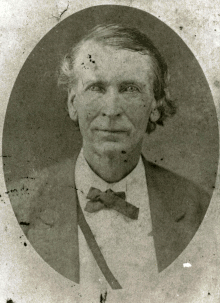Ira Roe Foster
| Ira Roe Foster | |
|---|---|
 |
|
| Quartermaster General of Georgia | |
|
In office 1861–1865 |
|
| Personal details | |
| Born |
January 19, 1811 Spartanburg County, South Carolina |
| Died | November 24, 1885 (aged 74) Etowah County, Alabama |
| Nationality | American |
| Political party | Democratic |
| Spouse(s) | Mildred Creighton Crook |
| Children | Amantha Camilla, Erycenia Penthecelia, Nancy Lucinda Creighton, and Marcus Lucuius |
| Occupation | teacher, medical doctor, attorney, soldier, businessman, politician |
| Military service | |
| Allegiance |
|
| Service/branch |
|
| Years of service | 1835–42 (USA) 1842–51 (Georgia Militia) |
| Rank |
|
| Commands |
|
| Battles/wars | Seminole Wars |
Ira Roe Foster (January 9, 1811 – November 19, 1885) was born along the Tyger River, in Spartanburg County, South Carolina. He was a teacher, medical doctor, attorney, soldier, businessman, and politician. During the 1840s, Foster served as brigadier general in the Georgia Militia. With the outbreak of the American Civil War, he was appointed Quartermaster General of the state of Georgia, a position he continued to hold after the war's end. He remained active in Georgia state politics into the Reconstruction period. Foster was also elected first mayor of Eastman, Georgia. He served in the Georgia House of Representatives, and was elected to the state senates of both Georgia and Alabama.
Ira Roe Foster was born on January 9, 1811, on the Tyger River, Spartanburg County, South Carolina, to Ransom and Nancy Foster. He became a school teacher at an early age, then studied medicine and practiced in South Carolina. He then moved to Georgia where he was elected, as a Democrat to the state senate, representing Forsyth County from 1838 to 1839. In 1841, Foster became a licensed lawyer in Cherokee County, Georgia, serving as that county's State Representative in the legislature. On September 2, 1845, U.S. Representative John H. Lumpkin wrote to President James K. Polk, urging President Polk to appoint Foster to a consular position in the West Indies. Lumpkin reminded the President that the whole of the Georgia delegation supported Foster's application. Foster did not receive the appointment. In addition to being a merchant, Foster maintained extensive business interests in land and flour and saw mills in north-central Georgia and Alabama. In early 1850, he also invested in the Dahlonega and Marietta Turnpike and Plank Road Company.
...
Wikipedia
